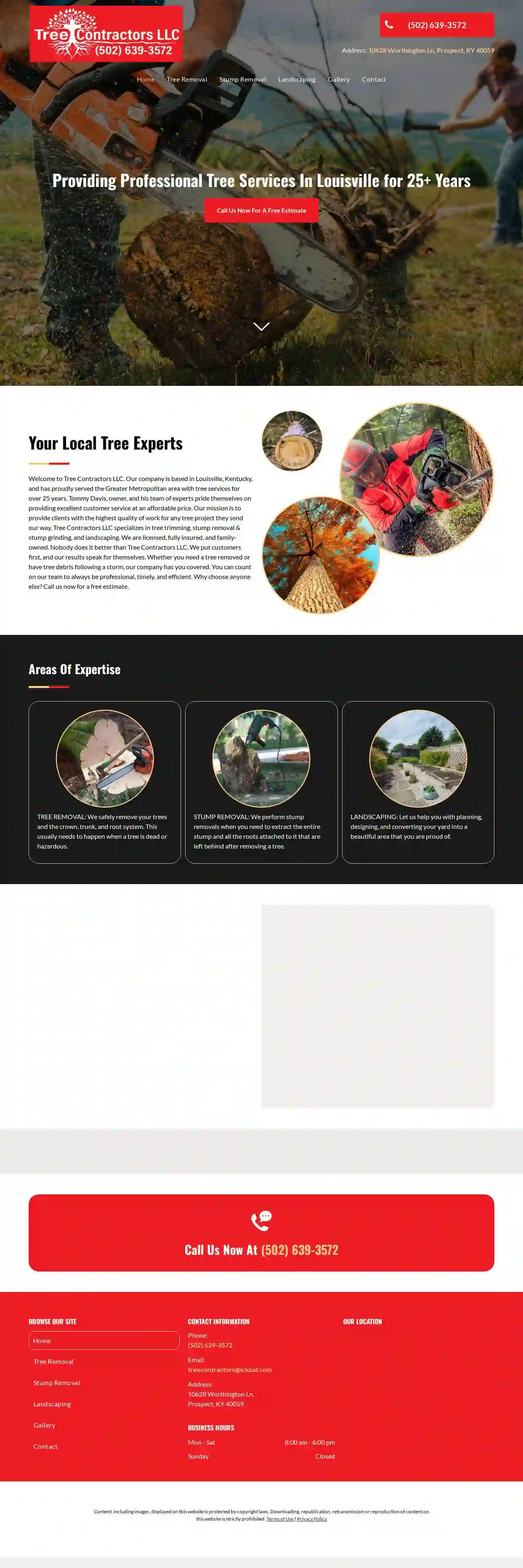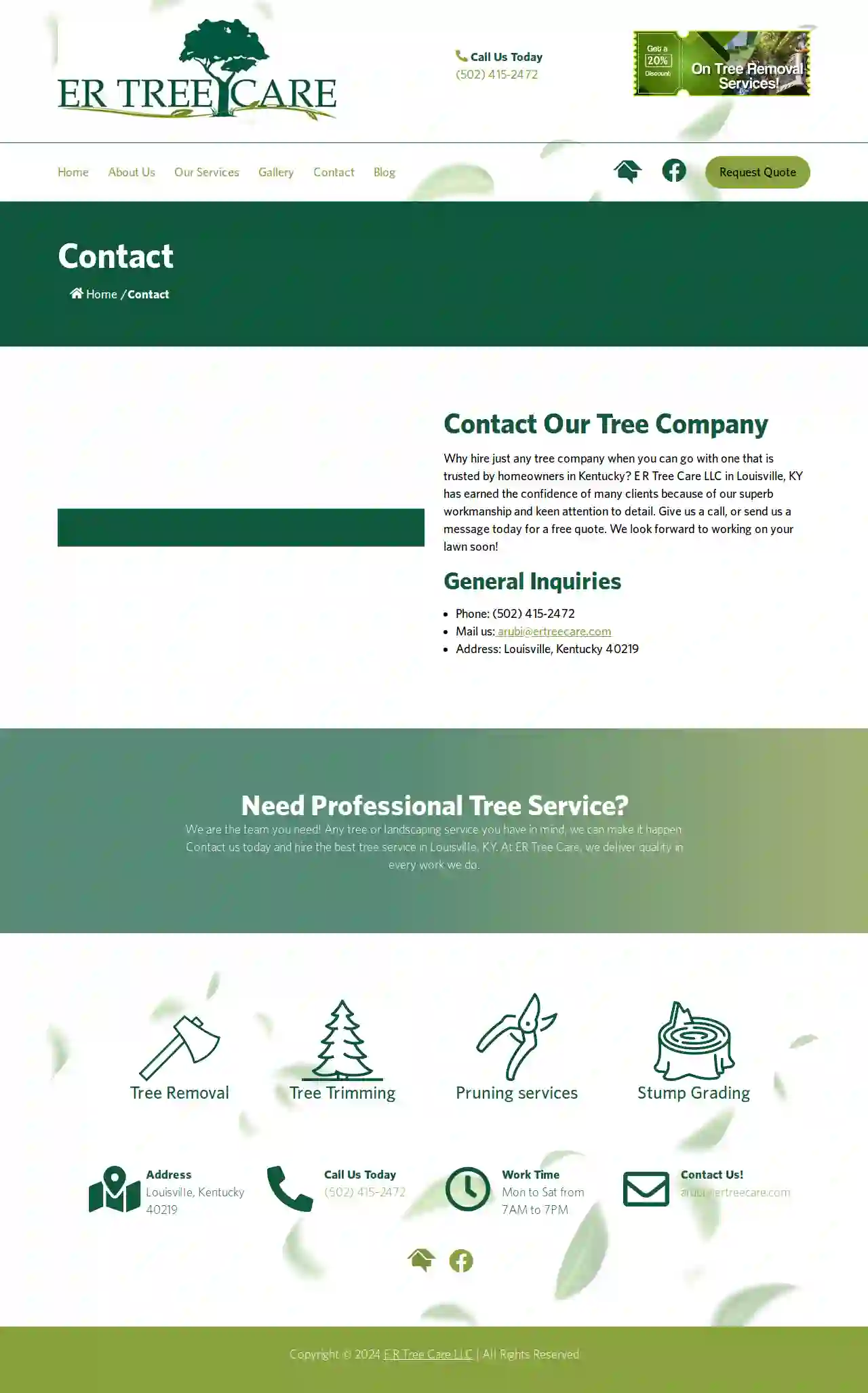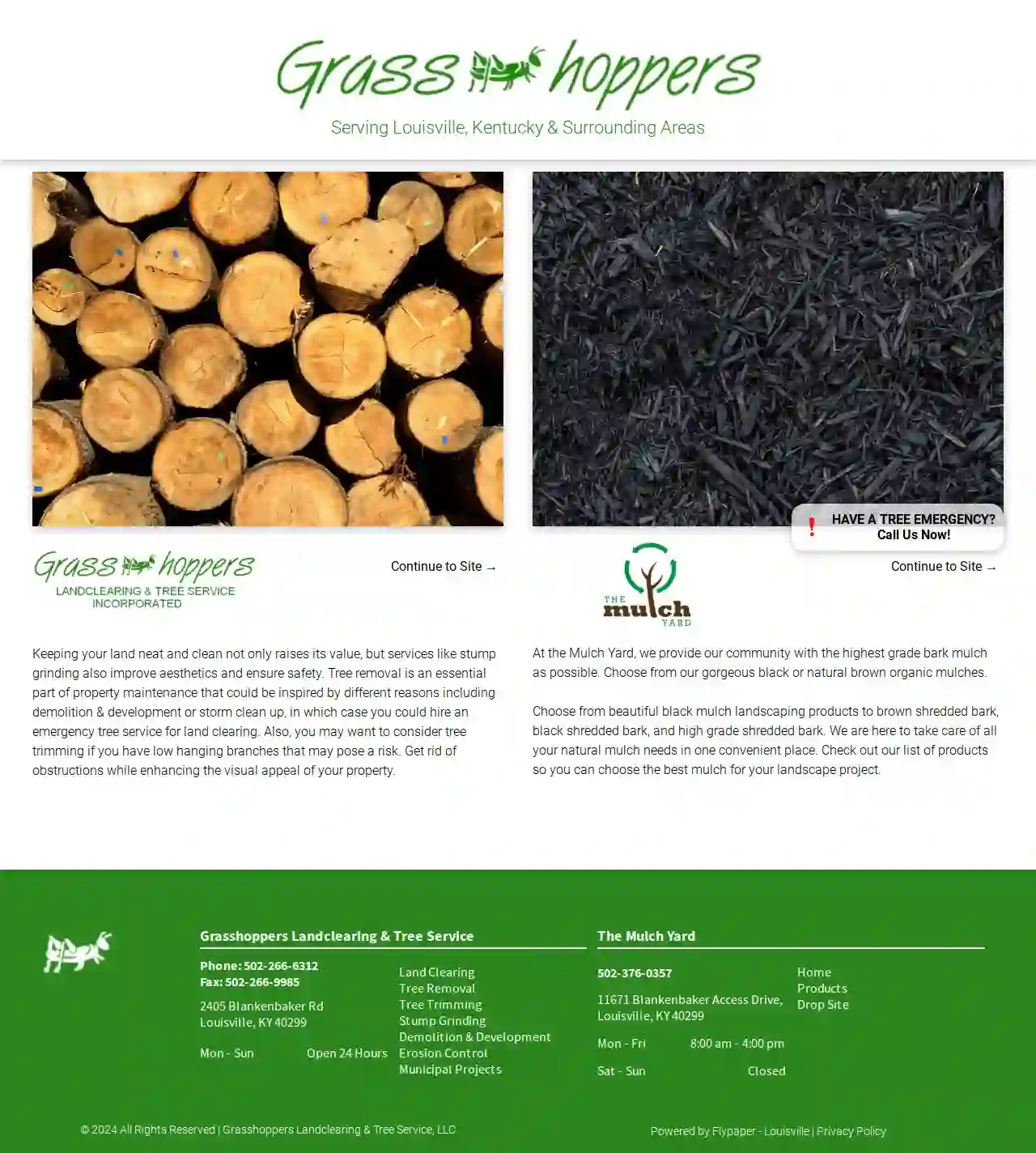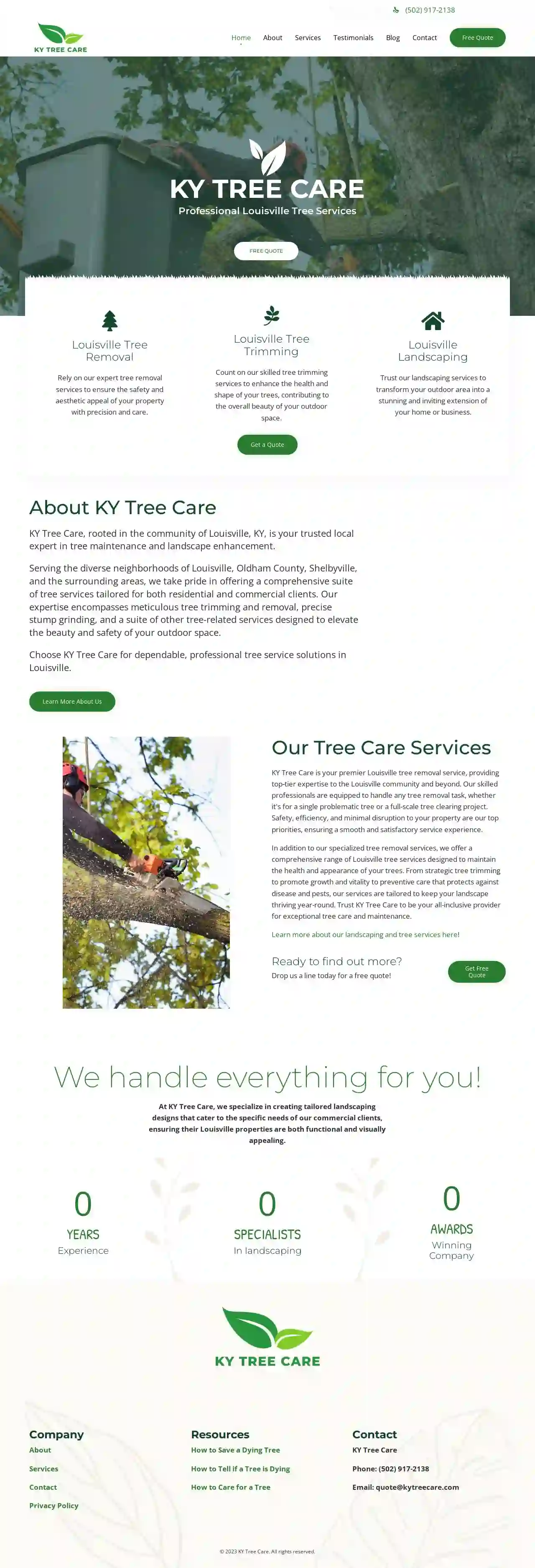Tree Service Princeton
Best Tree Services in Princeton
Receive 3 FREE Local Tree Service quotes for your project today! Compare profiles, reviews, accreditations, portfolio, etc... and choose the best deal.

Tree Contractors LLC
2.33 reviews10628 Worthington Ln, Louisville, 40059, USTree Contractors LLC is a family-owned business based in Louisville, Kentucky, that has been providing professional tree services for over 25 years. The company specializes in tree trimming, stump removal & stump grinding, and landscaping. They are licensed, fully insured, and pride themselves on providing excellent customer service at an affordable price. Their mission is to provide clients with the highest quality of work for any tree project they send their way.
- Services
- Why Us?
- Testimonials
- Gallery
Get Quote
ER Tree Care
Louisville, Kentucky, 40219, USE R Tree Care LLC was established in 2010. Our team is dedicated to total customer satisfaction, and we take pride in getting referrals from our clients. Whenever we leave a house, we want the owners to be happy with the work we have performed. In addition, we make sure that we constantly communicate with our clients so that they are updated on the project’s developments.
- Services
- Why Us?
- Accreditations
- Our Team
- Testimonials
- Gallery
Get Quote
Grasshoppers Landclearing and
4.58 reviews2405 Blankenbaker Rd, Louisville, KY, 40299, USGrasshoppers Landclearing & Tree Service is a local business based in Louisville, Kentucky, offering a variety of services including land clearing, tree removal, tree trimming, stump grinding, demolition & development, erosion control, and municipal projects. They also have a separate division called The Mulch Yard, which provides high-quality natural mulch products to the community.
- Services
- Why Us?
- Accreditations
- Our Team
- Testimonials
- Gallery
Get Quote
Louisville Tree Service Pro
4.85 reviews123 Elm Street, Louisville, 40205, USLouisville Tree Service Pro is a client-first company that focuses on providing top-quality tree care and landscaping services. They have a team of professionals who are experts in tree care and can help with a variety of services including tree trimming, pruning, emergency tree removal, tree planting, and more. Their goal is to provide optimal results that allow the trees on your property to stand out.
- Services
- Why Us?
- Accreditations
- Our Team
- Testimonials
- Gallery
Get Quote
New Leaf Tree Service
5119 reviews4124 Bishop Ln 103, Louisville, Ky, 40218, USNew Leaf Tree Service is a family-owned business with a passion for trees and a commitment to providing high-quality tree care services. Our team of experienced professionals offers a wide range of tree care services, including tree pruning, tree removal, stump grinding, and more. We are dedicated to providing our customers with the best possible service and always put the customer first.
- Services
- Why Us?
- Accreditations
- Gallery
Get Quote
Ashley's Tree Service
4.919 reviewsLouisville, Kentucky, 40299, USAshley's Tree Service is a family owned and operated business with over twenty years in business. The health and safety of your trees are what we specialize in. From hazardous tree removal to selective trimming, the professionals at Ashley's Tree Service have the experience and equipment to get the job done. Ashley's Tree Service offers free estimates and senior citizen discounts year-round. In addition, throughout the year we have discount coupons.
- Services
- Why Us?
- Accreditations
- Gallery
Get Quote
Shults Tree Service
4.84 reviews11501 Champions Way, Louisville, KY 40299, 40299, USLouisville Tree Service, also known as Tree Services Louisville and Louisville Tree Care, is a family-owned tree service with over 30-years of experience caring for the natural landscape of communities in Louisville & Jefferson County. Our skilled staff of tree surgeons and crew members offers competitive pricing and estimates to accommodate your needs. Our goal is to provide exceptional tree service, including tree removal services and maintenance, to all residential and commercial clients looking to maintain or improve the natural surroundings of their homes and businesses.
- Services
- Why Us?
- Accreditations
- Our Team
- Testimonials
- Gallery
Get Quote
Claycomb's Tree Service
56 reviews1234 Tree Lane, Louisville, 40299, USClaycomb's Tree Service is a customer-focused company that prioritizes quality service and professionalism. With a mission to provide the best possible experience for clients, the company offers a range of services including deadwooding, brush removal, tree removal, tree trimming, stump removal, and health evaluations. Claycomb's Tree Service is fully bonded, reliable, and trustworthy, with over 20 years of experience serving Louisville, KY, and surrounding areas.
- Services
- Why Us?
- Our Team
- Testimonials
- Gallery
Get Quote
KY Tree Care
123 Main St, Suite 100, Louisville, 40203, USKY Tree Care, rooted in the community of Louisville, KY, is your trusted local expert in tree maintenance and landscape enhancement. Our expertise encompasses meticulous tree trimming and removal, precise stump grinding, and a suite of other tree-related services designed to elevate the beauty and safety of your outdoor space.
- Services
- Why Us?
- Accreditations
- Our Team
- Testimonials
- Gallery
Get Quote
Monster Tree Service of East Louisville
4.9162 reviewsLouisville, USAt Monster Tree Service of East Louisville, we take pride in caring for all things green in the state of Kentucky. Whether your shrubs, hedges, or trees have become unruly, or pests are ruining the health and beauty of your outdoor landscape, our arborists in East Louisville can help. Our Louisville tree removal team proudly offers a wide variety of plant health care services. From tree removal, shrub pruning, tree trimming, stump grinding, or emergency tree removal services, we are here to help! With state-of-the-art equipment and eco-friendly methods, our Louisville tree service company will provide your yard with the meticulous attention to detail it needs and deserves. Our expert arborists in Louisville can provide you with quick and friendly tree services at affordable prices. As members of the Louisville community, we want to make sure our neighborhood looks its best and that our neighbors stay safe. That is why we offer storm damage tree removal services throughout Louisville. Trees that have been affected by extreme weather conditions may become weakened and can result in bodily harm or damage to your property. Contact the tree care experts at Monster Tree Service of East Louisville today to learn more! Get a FREE estimate for Louisville tree care services- call (502) 237-8125 today!
- Services
- Why Us?
- Gallery
Get Quote
Over 16,467+ Tree Service Contractors registered
Our tree care contractors operate in Princeton and surrounding areas!
TreeServiceMatch has curated and vetted the Best Tree Service Contractors arround Princeton. Find the most trustworthy pro today.
Frequently Asked Questions About Tree Services
- Safety: Felling a tree is extremely dangerous without proper training and equipment. Falling branches or the entire tree can cause serious injury or even death.
- Property Damage: If the tree falls in the wrong direction, it could damage your home, vehicles, or other structures on your property.
- Liability: If you cause damage to your neighbor's property or injure someone while cutting down a tree yourself, you could be held liable.
- Equipment: You'll need to invest in or rent specialized equipment like chainsaws, safety gear, ropes, and potentially a wood chipper.
- Disposal: You'll be responsible for disposing of the tree debris, which can be time-consuming and expensive, especially for large trees.
- Repairs: If the tree falls incorrectly and causes damage, you'll have to cover the cost of repairs.
- Insect Infestation: Some insects, like aphids, scales, or borers, feed on tree sap, causing it to drip or ooze from wounds or feeding sites.
- Disease: Certain diseases, like bacterial wetwood or slime flux, can cause sap to flow excessively from cracks or wounds in the bark.
- Mechanical Injury: Wounds or cuts in the bark, caused by pruning, storms, or other physical damage, can lead to sap dripping.
- Environmental Stress: Extreme heat, drought, or other environmental stresses can sometimes cause trees to produce excess sap.
- Communication: The first step is to talk to your neighbor and explain the issue. They may be willing to trim the roots or remove the tree if it's causing damage.
- Root Pruning: You can cut back the roots at the property line, but it's essential to do this carefully to avoid damaging the tree. Consult with a certified arborist for guidance on proper root pruning techniques.
- Root Barrier Installation: Installing a physical barrier, such as a thick plastic sheet or metal edging, can prevent roots from growing into your yard. The barrier should be at least 2 feet deep and extend several feet from the trunk.
- Chemical Control (Not Recommended): Chemical root killers are available, but they are generally not recommended due to potential environmental damage and the risk of harming the tree.
- Extensive dieback: Large portions of the tree's crown are dead, with no signs of new growth.
- Severe bark damage: Large sections of bark are missing or severely damaged, exposing the inner wood.
- Root decay: Mushrooms or conks growing at the base of the tree, indicating fungal decay in the root system.
- Leaning precariously: The tree is leaning significantly and showing signs of instability.
- No leaves or buds: During the growing season, the tree is completely bare of leaves and shows no signs of new buds forming.
- Woodpecker holes: While a few woodpecker holes are not necessarily a cause for concern, numerous holes can indicate insect infestation or decay within the tree.
Is it cheaper to cut down a tree yourself?
Risks:
Costs:
In most cases, the risks and potential costs outweigh any perceived savings from DIY tree removal. Hiring a professional tree service company is the safest and often the most cost-effective option in the long run. They have the experience, equipment, and insurance to handle the job properly and protect you from liability.
Why is my tree dripping sap?
How do I stop my neighbor's tree roots from growing into my yard?
How do I know if a tree is dying?
Is it cheaper to cut down a tree yourself?
Risks:
- Safety: Felling a tree is extremely dangerous without proper training and equipment. Falling branches or the entire tree can cause serious injury or even death.
- Property Damage: If the tree falls in the wrong direction, it could damage your home, vehicles, or other structures on your property.
- Liability: If you cause damage to your neighbor's property or injure someone while cutting down a tree yourself, you could be held liable.
Costs:
- Equipment: You'll need to invest in or rent specialized equipment like chainsaws, safety gear, ropes, and potentially a wood chipper.
- Disposal: You'll be responsible for disposing of the tree debris, which can be time-consuming and expensive, especially for large trees.
- Repairs: If the tree falls incorrectly and causes damage, you'll have to cover the cost of repairs.
In most cases, the risks and potential costs outweigh any perceived savings from DIY tree removal. Hiring a professional tree service company is the safest and often the most cost-effective option in the long run. They have the experience, equipment, and insurance to handle the job properly and protect you from liability.
Why is my tree dripping sap?
- Insect Infestation: Some insects, like aphids, scales, or borers, feed on tree sap, causing it to drip or ooze from wounds or feeding sites.
- Disease: Certain diseases, like bacterial wetwood or slime flux, can cause sap to flow excessively from cracks or wounds in the bark.
- Mechanical Injury: Wounds or cuts in the bark, caused by pruning, storms, or other physical damage, can lead to sap dripping.
- Environmental Stress: Extreme heat, drought, or other environmental stresses can sometimes cause trees to produce excess sap.
How do I stop my neighbor's tree roots from growing into my yard?
- Communication: The first step is to talk to your neighbor and explain the issue. They may be willing to trim the roots or remove the tree if it's causing damage.
- Root Pruning: You can cut back the roots at the property line, but it's essential to do this carefully to avoid damaging the tree. Consult with a certified arborist for guidance on proper root pruning techniques.
- Root Barrier Installation: Installing a physical barrier, such as a thick plastic sheet or metal edging, can prevent roots from growing into your yard. The barrier should be at least 2 feet deep and extend several feet from the trunk.
- Chemical Control (Not Recommended): Chemical root killers are available, but they are generally not recommended due to potential environmental damage and the risk of harming the tree.
How do I know if a tree is dying?
- Extensive dieback: Large portions of the tree's crown are dead, with no signs of new growth.
- Severe bark damage: Large sections of bark are missing or severely damaged, exposing the inner wood.
- Root decay: Mushrooms or conks growing at the base of the tree, indicating fungal decay in the root system.
- Leaning precariously: The tree is leaning significantly and showing signs of instability.
- No leaves or buds: During the growing season, the tree is completely bare of leaves and shows no signs of new buds forming.
- Woodpecker holes: While a few woodpecker holes are not necessarily a cause for concern, numerous holes can indicate insect infestation or decay within the tree.